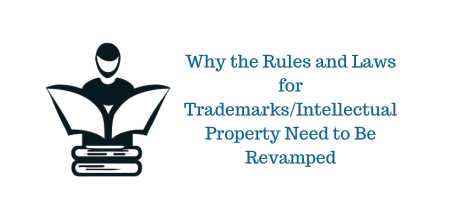_______________________________________________________________________________ Don't Forget: As an Affiliate, I Earn from Qualifying Purchases. If you click on any Amazon, Chewy, Walmart, or other links on my site and make a purchase through those companies, I may receive a small percentage of that sale at no extra cost to you. This helps me pay for the upkeep and maintenance of my site. You'll also notice advertisements on my site, which help contribute to the costs of running the site. _______________________________________________________________________________
An in-depth thought experiment for revamping trademark laws
The modern world is governed by an intricate web of intellectual property laws, a significant portion of which revolves around trademarks. Trademarks are powerful tools meant to safeguard businesses, fostering brand recognition and ensuring fair competition. However, the current state of trademark laws worldwide has raised critical concerns. An emerging trend of copyrighting everyday words and phrases not only affects the way businesses operate but has substantial repercussions for creativity, innovation, and linguistic freedom.
1. Erosion of Language and Creativity
- Monopolizing Common Words: One of the primary concerns is the privatization of common language. When everyday words become the property of companies or individuals, it puts a damper on creativity and linguistics. Words that once belonged to the public domain are now restricted, leading to a chilling effect on artistic and entrepreneurial ventures.
- Stifling Creativity: The excessive copyrighting of phrases can also hinder the creation of new content. Imagine if terms like “winter is coming” or “just do it” were heavily policed. It could potentially lead to an atmosphere where content creators are hesitant to use commonplace idioms or expressions, fearing legal repercussions.
2. Ambiguity Leads to Unnecessary Litigations
- Current trademark laws often lead to ambiguity, where a trademark might be granted for generic words or terms without distinctive character. Such ambiguous situations lead to increased litigations, with companies spending vast resources on legal battles over trivialities, detracting from their core competencies.
3. Impact on Small Businesses and Entrepreneurs
- The trend of monopolizing words and phrases disproportionately affects small businesses. Large corporations with significant financial muscle can monopolize generic terms, making it tough for startups or small enterprises to name or market their products. This is counterproductive to fostering a thriving entrepreneurial ecosystem.
4. Implications for the Digital Age and AI
- As we march into the age of AI, issues concerning linguistic properties become even more pronounced. AIs, such as chatbots or content generators, draw from vast datasets and language models. If everyday terms and phrases are trademarked, it could lead to numerous inadvertent infringements, making AI-driven solutions less viable.
- Moreover, AI systems can be programmed to create a virtually infinite number of phrases, potentially exhausting the linguistic space. If these phrases were to be trademarked, it would be impractical and detrimental to human linguistic creativity.
5. The Spirit of Trademark Laws
- The essence of trademark law is to prevent confusion among consumers about the source of goods and services. It’s not meant to grant businesses monopoly rights over generic or descriptive terms. This principle is being increasingly overlooked, leading to a distortion of the law’s original intent.
Solutions and the Way Forward
- Review and Tighten Eligibility Criteria: There needs to be a stringent review mechanism to evaluate the uniqueness and distinctiveness of words or phrases before they’re trademarked.
- Strengthening Opposition and Review Procedures: Improve processes where stakeholders, including linguistic experts and the general public, can oppose or review trademarks that are deemed excessive or inappropriate.
- Redefining Trademark Durations: With the rapid pace of the digital world, perhaps it’s time to reconsider the longevity of trademarks, making them more transient and adaptable to the times.
- AI and Copyright: Specific guidelines need to be established for AI-generated content and linguistic properties, ensuring that innovation isn’t stifled by outdated laws.
What it comes down to, while trademarks are essential to protect genuine business interests, the excessive and unwarranted copyrighting of everyday language poses significant challenges. A comprehensive review and revamp of existing laws and practices are imperative to ensure that they remain relevant, fair, and conducive to creativity and innovation in the modern age.
What are your thoughts? Do you agree? Do you disagree? Should they reevaluate the laws governing trademarks and consider revamping trademark laws? Leave your comments below and let’s see what we can do about it!
-TID

Let’s get the discussion started! Do you agree or disagree?